How IT Services Are Transforming Healthcare
Krunal Panchal
February 28, 2025 71 Views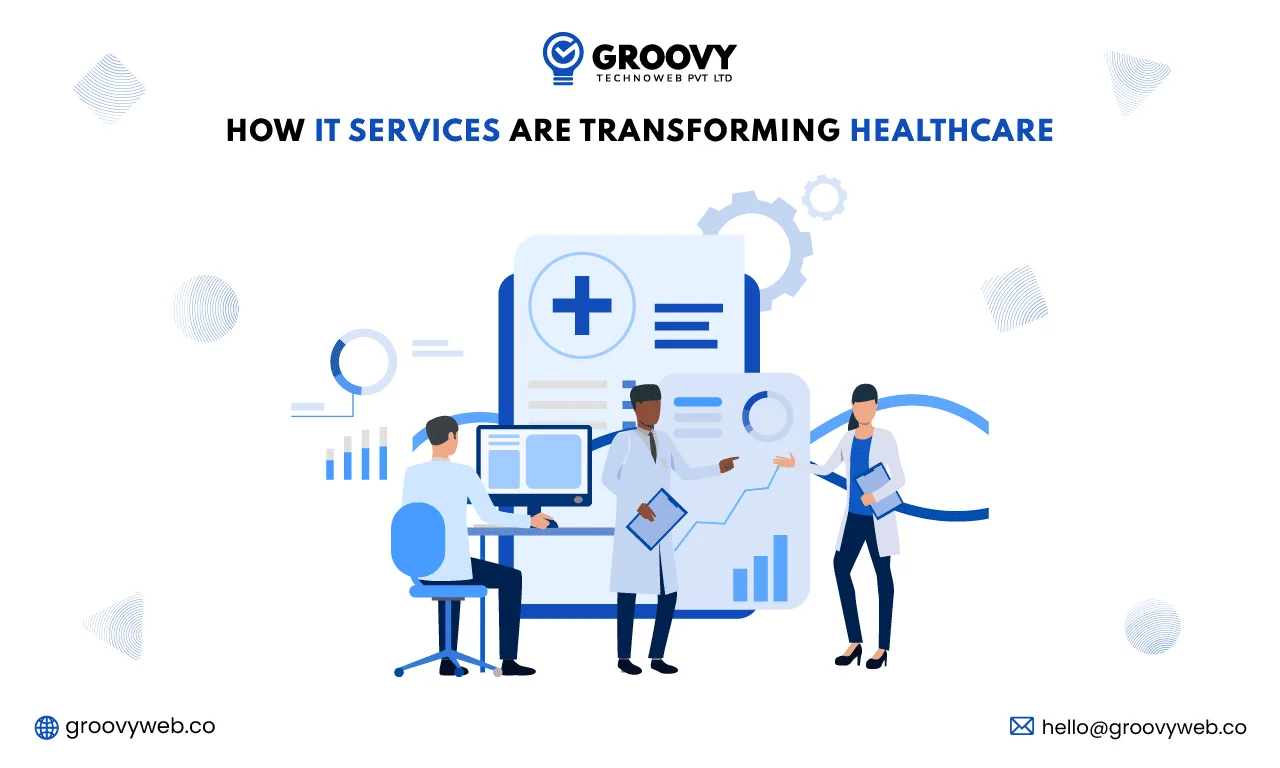
Quick Summary : Healthcare IT services are transforming the industry by enhancing patient care, efficiency, and security. EHRs, telemedicine, and AI improve diagnostics, reduce errors, and enable remote consultations. Cybersecurity ensures HIPAA and GDPR compliance, while data analytics supports better decision-making. These innovations streamline healthcare management, improve accessibility, and drive better patient outcomes.
Digital change in healthcare is reshaping the enterprise and growing efficiency, and patients are enhancing the effects. Healthcare information technology services are crucial in modernising hospitals, clinics, and medical institutions. These offerings streamline operations, reduce errors, and ensure smooth communication in healthcare.
Electronic Health Records (EHR) to AI in healthcare are examples of how era adjustments patient care. The growth of telemedicine solutions sheds light on the significance of digital innovations.
The Role of IT Services in Healthcare
Technology has replaced healthcare and increased efficiency, safety, and patient results. Healthcare services are important by technology, which has improved patient outcomes, safety, and efficiency. Data protection, better diagnosis, and operational efficiency are all made possible by healthcare IT services.
IT services are changing the healthcare sector with everything from Electronic Health Records (EHR) to AI-driven healthcare solutions. This area keeps growing as medical institutions use automation and telemedicine technologies, improving patients’ access to high-quality care worldwide.
As healthcare facilities adopt telehealth solutions and automation, this region continues to develop, providing better access and quality care to patients worldwide.
1. Enhancing Patient Care and Outcomes
Implementing healthcare IT consulting services has progressed patient care by enabling better diagnostics and treatment plans. AI in healthcare assists doctors in detecting diseases early, leading to more effective remedies.
Additionally, access to real-time records ensures well-timed clinical interventions, enhancing healthcare delivery. The global healthcare IT market, worth US$368.15 billion in 2023, is forecasted to grow at a robust CAGR of 14.7%, achieving US$420.23 billion in 2024 and an excellent US$834.35 billion through 2029.
Technological advancements, the growing adoption of telehealth services, and the growing importance of person-generated virtual health information specifically force the marketplace’s increase. The increasing adoption of telemedicine drives this enlargement, as do electronic health records (EHRs) and AI-driven diagnostic equipment.
2. Improving Operational Efficiency
Hospitals and clinics use digital transformation in healthcare to streamline, increase productivity, and reduce operating costs. Automation in scheduling, billing, and electronic health records (EHR) management has considerably reduced human mistakes.
AI-driven gadgets enable personalised, useful resource allocation, lessen ready time, and enhance basic patient management. Additionally, custom telemedicine solutions have revolutionized patient care by reducing unnecessary clinic visits, permitting physicians to focus on important subjects and make certain spontaneous verbal exchanges among healthcare experts and patients.
3. Strengthening Compliance and Data Security
As healthcare companies include virtual services, cybersecurity has become an essential challenge. Protecting touchy-affected personal information from cyber threats, ransomware attacks, and unauthorized access calls for superior protection functions, including encryption and multi-component authentication.
Healthcare IT services and solutions ensure strict policies, HIPAA, and GDPR compliance, stopping records breaches and legal consequences. By enforcing blockchain technology and AI-driven danger detection, healthcare institutions can boost information integrity, ensure patient trust, and maintain steady digital healthcare ecosystems.
4. Strengthening Data Security and Compliance
As healthcare companies embody digital answers, healthcare cybersecurity has become crucial. Protecting touchy affected person facts from cyber threats, ransomware attacks, and unauthorized access requires advanced security features, encryption, and multi-factor authentication.
Digital Healthcare IT services ensure compliance with strict policies, including HIPAA and GDPR, and stop data breaches and felony penalties. By implementing blockchain generation and AI-driven danger detection, healthcare establishments can strengthen data integrity, ensuring patients have and retain consistent virtual healthcare ecosystems.
Key IT Services that are Driving Healthcare Transformation
Advanced IT services are transforming healthcare by improving patient care, simplifying operations, and increasing data security. For improved health outcomes, this technology promotes efficiency, supports telemedicine, and enables statistics-driven decision-making.
1. Electronic Health Records (EHR) & EMR Solutions
Electronic Health Records (EHR) have transformed healthcare by digitizing patient information, reducing medical errors, and enhancing performance. These structures keep patient records, prescriptions, and lab results, ensuring seamless access for healthcare vendors.
Healthcare IT services combine EHR with AI-pushed insights, allowing predictive analytics for higher diagnoses. EHR systems also improve interoperability, enabling clinics and hospitals to calculate percentages safely.
As the healthcare industry undergoes a digital transformation, the use of EHR is increasing because it improves patient results and streamlines procedures.
2. Telemedicine & Remote Patient Monitoring (RPM)
Telemedicine Solutions have revolutionized healthcare by enabling far-off consultations, reducing in-person visits, and increasing reach. Remote Patient Monitoring (RPM) permits real-time vitals monitoring, improving persistent illness management.
Digital Telemedicine solutions bridge the gap between patients and healthcare providers, ensuring well-timed interventions. AI-powered analytics detect fitness anomalies early, preventing headaches.
As part of healthcare IT services, telehealth technologies enhance patient care, supplying personalized treatment alternatives. The growing reliance on virtual healthcare ensures higher consequences and stepped-forward efficiency.
3. Artificial Intelligence (AI) and Machine Learning (ML) in Diagnostics
The rise of AI in healthcare has significantly progressed diagnostic accuracy and velocity. Machine learning algorithms analyze sizable scientific datasets, figuring out patterns that aid early disease detection.
AI-driven gear decorates clinical imaging, detecting conditions like cancer and cardiovascular sicknesses with excessive precision. Automated systems help doctors in medical decision-making, ensuring accurate diagnoses.
With healthcare IT services advancing, AI-powered solutions reduce diagnostic errors and decrease expenses. AI is remodeling healthcare, leading to advanced patient care and optimized treatments.
4. Healthcare Data Analytics & Business Intelligence
Data analytics is driving smart choice-making inside the healthcare quarter. Healthcare IT services use predictive analytics to track disorder developments, manipulate health center assets, and refine treatment techniques AI-powered enterprise intelligence equipment methods large datasets, supporting clinical professionals in making facts-driven selections.
Digital transformation in healthcare promotes real-time analytics, enhancing patient engagement and operational performance. Hospitals leverage data insights to reduce readmission fees and decorate personalized remedies. As healthcare technology evolves, analytics-driven services are vital for higher outcomes.
5. Cybersecurity and Compliance (HIPAA, GDPR, etc.)
With rising cyber threats, healthcare cybersecurity is more crucial than ever. HIPAA and GDPR compliance guarantee secure patient data management, minimizing the danger of breaches.
Encryption, multi-element authentication, and the blockchain era reinforce cybersecurity frameworks. AI-driven security solutions discover anomalies, stopping unauthorized entry to medical records. As healthcare mobile app development services expand, sturdy security protocols protect sensitive information. The increasing use of digital transformation in healthcare highlights the need for strict cybersecurity measures to ensure information safety and regulatory compliance.
6. Cloud Computing & Infrastructure in Healthcare
Cloud computing has transformed healthcare by supplying scalable, value-powerful data storage solutions. Hospitals use cloud structures to access patient statistics, seamlessly enhancing collaboration. Digital transformation in healthcare drives cloud adoption, ensuring interoperability among healthcare providers.
AI-powered cloud systems optimize clinical workflows, improving performance. Healthcare IT services allow stable, HIPAA-compliant cloud storage, reducing infrastructure expenses. As telemedicine expands, cloud computing guarantees real-time access to health information, making healthcare more responsive, integrated, and era-driven.
7. Automation & Robotic Process Automation (RPA) in Healthcare Workflows
Automation and Robotic Processes are rebuilding healthcare workflows through automation (RPA) to increase performance, reduce errors, and increase patient care. Healthcare IT services permit administrative and medical project automation, optimizing clinic operations. RPA streamlines data entry, billing, and compliance reporting, decreasing manual attempts and improving accuracy.
Adopting digital transformation in healthcare guarantees seamless integration of automation gear, leading to better useful resource allocation and stronger patient studies. As technology advances, automation continues to reshape healthcare operations with forward effects.
8. Streamlining Administrative Workflows
Administrative responsibilities in healthcare can be time-consuming and at risk of mistakes. Healthcare IT service providers streamline these workflows through automation, decreasing office work and enhancing efficiency.
Digital services help in appointment scheduling, claims processing, and patient report management. Electronic Health Records (EHR) further enhance the accessibility of records, minimizing redundancies.
With the digital transformation in healthcare, hospitals and clinics can allocate resources efficiently, ensuring higher patient reviews. AI-driven tools also automate documentation, enabling accurate compliance reporting. Customized administrative workflows contribute to seamless healthcare operations and advanced monetary management.
Automation reduces administrative burden and streamlines repetitive billing, scheduling, and claim processing functions. Healthcare IT services permit efficient project automation, allowing healthcare companies to focus more on patient care.
9. Enhancing Accuracy with RPA
Robotic Process Automation (RPA) enhances efficiency and minimizes mistakes in healthcare operations. By automating statistics access and patient record management, digital transformation in healthcare improves the typical workflow accuracy. RPA also helps validate real-time statistics, decreasing discrepancies in scientific facts.
Additionally, automated reporting guarantees compliance with enterprise guidelines, reducing the chance of guideline mistakes. With superior healthcare IT services, RPA contributes to better aid allocation, ultimately improving patient care and health center efficiency.
Robotic Process Automation (RPA) complements performance and minimizes errors in healthcare operations. By automating data entry and affecting personal document control, digital transformation in healthcare improves universal workflow accuracy.
10. Optimising Revenue Cycle Management
Effective revenue cycle control (RCM) is critical for the economic stability of healthcare businesses. Automating financial tactics such as medical billing, insurance claims, and patient payment tracking minimizes mistakes and delays.
Healthcare IT services provide real-time economic insights, improving cash flow and optimizing aid allocation. Additionally, predictive analytics help forecast sales trends, allowing institutions to implement value-effective strategies.
With digital transformation in healthcare, RCM automation streamlines operations, reduces administrative workload and ensures accurate compensation procedures, enhancing monetary effects and operational efficiency.
It also automates financial strategies consisting of scientific billing and insurance claims to minimize delays and errors. Healthcare IT services provide real-time insights into economic information, leading to advanced sales cycle control.
11. Supporting Compliance and Documentation
Ensuring regulatory compliance in healthcare calls for accurate and stable documentation. Automated compliance services streamline reporting, reducing guide mistakes and enhancing accuracy.
Healthcare cybersecurity measures defend sensitive information from breaches even by ensuring adherence to rules like HIPAA and GDPR. Advanced healthcare IT services also guide virtual documentation management, permitting seamless auditing and document maintenance.
AI-driven compliance equipment beautifies efficiency by automating coverage updates and tracking regulatory modifications, ensuring healthcare companies follow evolving standards. Automated systems ensure accurate documentation and regulatory compliance. Healthcare cybersecurity solutions shield sensitive patient information whilst streamlining reporting requirements.
Benefits of IT Services in Healthcare
Integrating healthcare IT Software services has revolutionized medical care, improving patient engagement, operational performance, and decision-making. Advanced technology, consisting of telemedicine solutions, AI in healthcare, and information analytics, ensures seamless verbal exchange, decreased costs, and improved treatment effects. These improvements pressure digital transformation in healthcare, promoting accessibility and security in clinical operations.
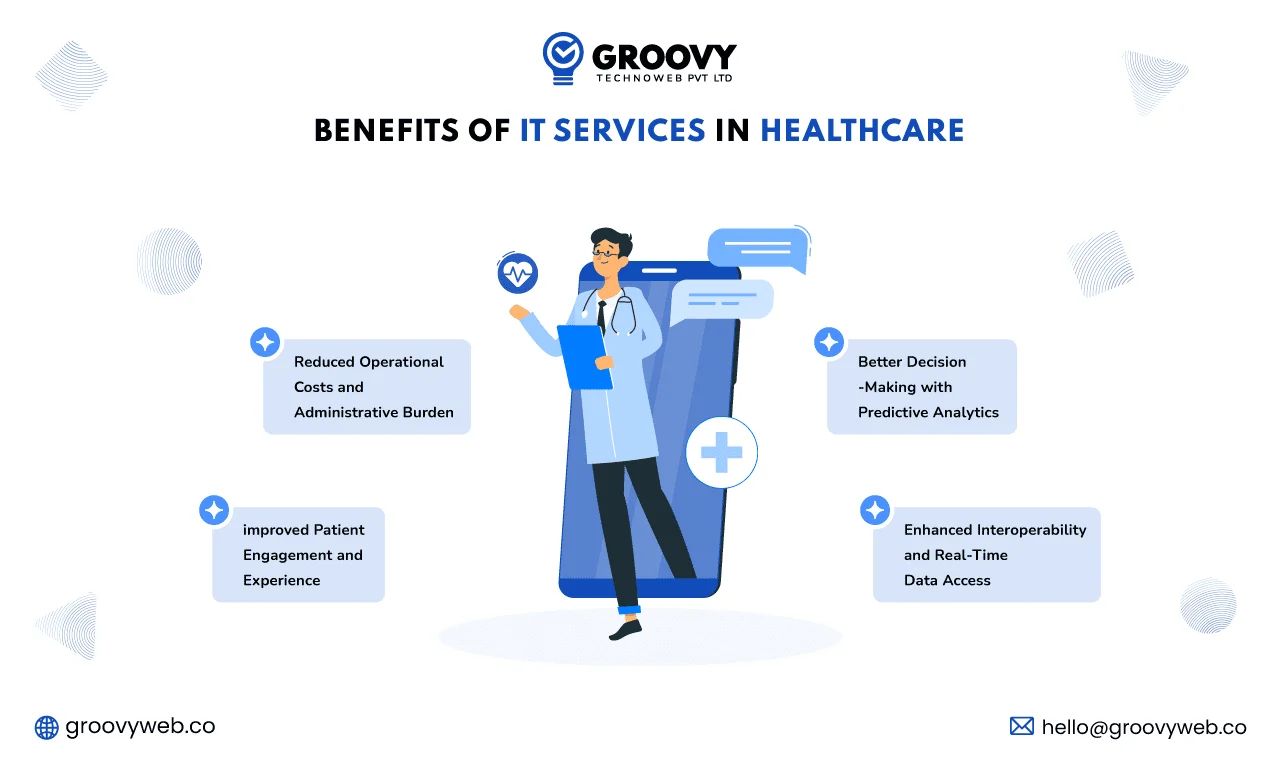
Improved Patient Engagement and Experience
Healthcare IT services enhance patient engagement by imparting access to non-public clinical statistics, digital consultations, and automated appointment scheduling.
Patient portals and cellular programs allow customers to view prescriptions, display vitals, and acquire real-time fitness updates. AI-driven chatbots assist in servicing queries and enhancing responsiveness.
Telemedicine solutions provide far-off access to healthcare professionals, lowering wait times and improving comfort. Digital tools empower sufferers, fostering higher communication among doctors and people and, in the long run, enhancing satisfaction, adherence to remedy plans, and overall healthcare reviews.
Reduced Operational Costs and Administrative Burden
Healthcare IT services appreciably reduce operational prices and optimize aid allocation by automating habitual administrative obligations. Electronic documentation eliminates office work, saving time for healthcare experts. AI-powered automation streamlines billing, coverage claims, and scheduling, reducing human errors and delays.
Cloud-based solutions do away with the need for highly-priced physical garages, cutting infrastructure expenses. Digital transformation in healthcare ensures better economic performance by optimizing workflows and minimizing redundant tactics. These improvements make healthcare establishments aware of the need to improve patient care while maintaining fee effectiveness.
Better Decision-Making with Predictive Analytics
Predictive analytics, a critical component of healthcare IT solutions, enables statistics-driven decision-making. AI-powered algorithms examine scientific datasets to identify potential disease outbreaks, check remedy effectiveness, and optimize patient control. Hospitals use analytics to forecast patient admissions, allocate assets correctly, and reduce readmission prices. Real-time insights help doctors customize treatment plans, improving medical outcomes.
Artificial Intelligence complements early disease detection and danger evaluation, leading to proactive healthcare strategies and improved patient protection—predictive analytics guarantees higher healthcare plans and effective selection-making.
Enhanced Interoperability and Real-Time Data Access
Interoperability in healthcare website development services allows seamless statistics to alternate amongst specific healthcare carriers, enhancing coordinated patient care. Electronic Health Records (EHR) ensure real-time entry to affected personal facts, reducing errors and enhancing analysis accuracy. Cloud-based total structures enable immediate sharing of scientific data across hospitals, pharmacies, and specialists. AI-driven statistics control complements record accessibility, enhancing remedy performance. Digital transformation in healthcare promotes integration among systems, ensuring patient facts are up-to-date, steady, and effortlessly retrievable for higher healthcare coordination and clinical decision-making.
Challenges in Implementing IT Services in Healthcare
Applying for healthcare IT services comes with diverse challenges, safety risks, device integration issues, and regulatory compliance. While digital transformation in healthcare improves performance, it’s critical for comfortable adoption and the most efficient affected person care.
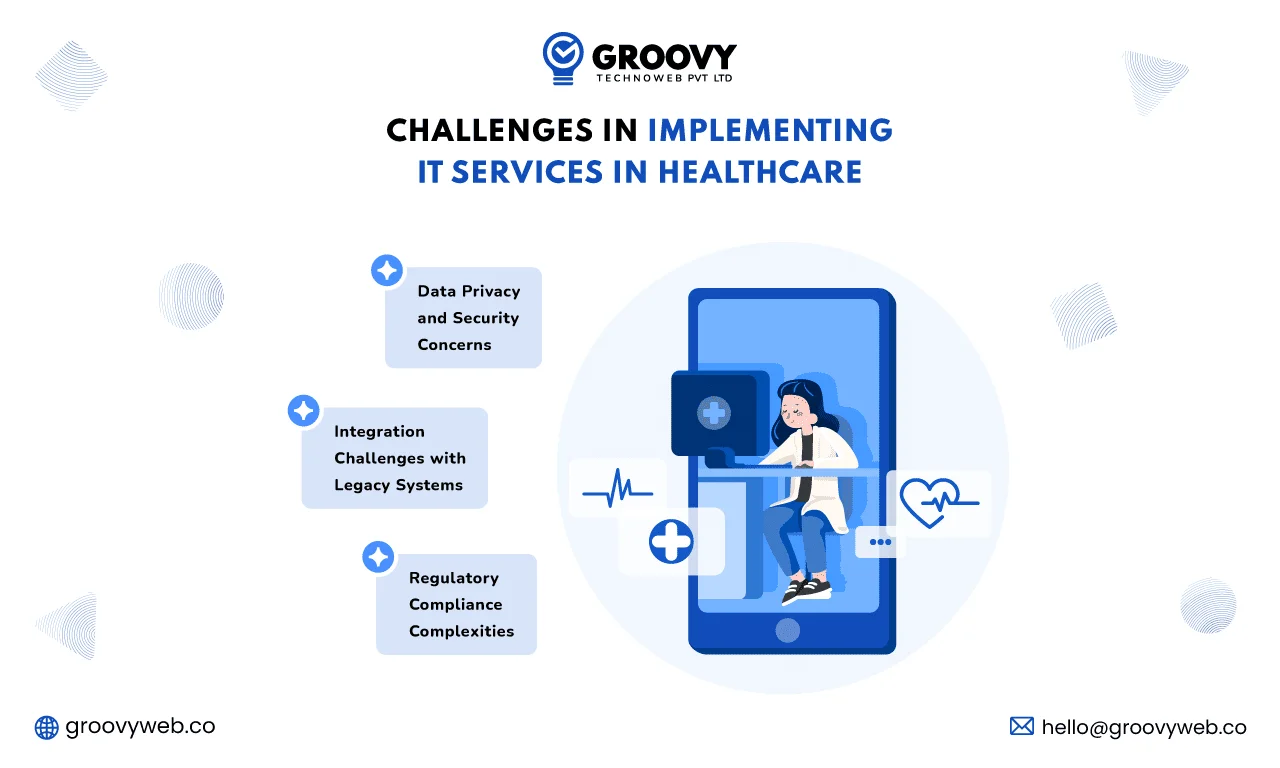
Data Privacy and Security Concerns
Despite improvements, healthcare cybersecurity remains a vital trouble. The upward thrust in cyber threats, including ransomware and phishing attacks, puts touchy affected person facts at threat. In 2023 by myself, healthcare records breaches affected over 133 million pieces of information, emphasizing the need for stringent security frameworks. Encryption, AI-pushed threat detection, and multi-thing authentication help mitigate dangers. However, continuous safety monitoring and adherence to HIPAA and GDPR policies are crucial to safeguard affected person’s information and maintain agreement within digital healthcare answers.
Integration Challenges with Legacy Systems
Many healthcare facilities still rely on previous IT infrastructure, making it difficult to undertake modern-day healthcare IT services. Legacy systems often lack interoperability, slowing down statistics exchange and decreasing performance. Upgrading to cloud-based solutions and AI-driven systems can decorate connectivity, but excessive prices and technical constraints restrict implementation. Additionally, the workers’ education and workflow modifications add to the complexity. Addressing those integration issues is prime to achieving a completely virtual and interconnected healthcare ecosystem that improves patient effects.
Regulatory Compliance Complexities
Compliance with policies like HIPAA in the U.S. and GDPR in Europe ensures the safety of patient records. However, navigating these laws can be tough. Healthcare providers must align IT solutions with evolving criminal requirements, frequently demanding sizable time and assets. Non-compliance risks extreme consequences, making healthcare IT services with integrated compliance functions important. Automated compliance tracking, blockchain for steady statistics storage, and AI-powered audits assist in streamlining adherence. Successfully balancing innovation with regulatory responsibilities is important for healthcare digitalization.
Future of Healthcare IT Services
Innovations like AI, blockchain, and IoT-enabled smart hospitals are driving the future of healthcare IT services. These technologies improve patient care, streamline operations, and boost healthcare cybersecurity, ensuring a more green and stable scientific environment.
The Rise of AI-Driven Personalized Medicine
AI-powered services transform healthcare by enabling personalized treatment plans based on genetic, lifestyle, and clinical statistics. AI in healthcare helps expect dangers of sickness, optimizing cures for man or woman sufferers. Machine-gaining knowledge of models analyzes substantial datasets, figuring out the most effective remedies. AI-driven diagnostics beautify precision medicine, reducing trial-and-error prescriptions. With healthcare IT services, customized remedies result in quicker recovery times, decreased healthcare costs, and advanced affected person satisfaction. The continuous evolution of AI guarantees higher, extra statistics-driven healthcare solutions for the future.
Expansion of Blockchain in Healthcare Data Security
Blockchain technology gives secure and tamper-evidence file-maintaining. Healthcare cybersecurity will see extended adoption of blockchain for statistics protection. Blockchain technology is increasingly recognized for its capability to decorate facts about safety in healthcare via services that are secure and tamper-proof report-maintaining structures. Global blockchain development in the healthcare market is projected from USD 67 million in 2024 to USD 641 million by 2035, representing a compound annual growth fee (CAGR) of 22.8%.
Growth of IoT-Enabled Smart Hospitals
The integration of IoT in healthcare is transforming health facility operations through real-time tracking, automated workflows, and predictive renovation. IoT-enabled devices track critical symptoms, alerting medical personnel to crucial changes immediately. Smart sensors enhance inventory control, ensuring efficient t useful resource allocation. Digital transformation in healthcare promotes IoT adoption, enhancing affected person safety and operational efficiency. AI-driven IoT programs streamline diagnostics and decrease reaction times. As hospitals embrace IoT, healthcare shipping becomes more information-driven, personalized, and proactive, leading to better-affected patient outcomes.
How CIOs, IT Heads, and Healthcare Administrators Can Leverage IT Services
Healthcare IT services play an important role in adapting operations, enhancing patient care, and ensuring data security. CIOs, IT chiefs, and administrators must adopt state-of-the-art techniques, including telemedicine solutions, AI in healthcare, and electronic health records (EHR) to run health services efficiently, compliance, and innovation.
Major Considerations for Choosing Healthcare IT Services
Selecting proper healthcare IT services requires evaluating safety, scalability, and regulatory compliance. Organizations should prioritize healthcare cybersecurity to mold sensitive facts and ensure HIPAA and GDPR compliance. Electronic health records (EHR) and AI in healthcare must be aligned with interoperability desires, ensuring seamless data changes. Additionally, ease of price efficiency and implementation should be considered to maximize efficiency and return on investment.
Building a Scalable and Secure IT Infrastructure
A robust IT infrastructure is essential for modern healthcare. Healthcare app development enables seamless data access through cloud-based solutions, enhancing scalability across multiple facilities. Digital transformation is driving cloud adoption, minimizing dependence on traditional servers. Advanced security measures like encryption, AI-driven monitoring, and blockchain strengthen healthcare cybersecurity. Additionally, telemedicine apps and automated workflows improve patient care, reduce downtime, and ensure regulatory compliance.
Practices for Successful Digital Transformation
A well-planned digital transformation in healthcare guarantees efficiency and stronger consequences for affected persons. IT leaders should have the right training to assist healthcare staff in implementing new technology like AI in healthcare and electronic health records (EHR), and implementing healthcare IT services with interoperability guarantees clean integration with present systems. Continuous performance checks, consumer comments, and cybersecurity updates boost virtual strategies, ensuring sustainable and secure healthcare IT improvements.
Practices for Successful Digital Transformation
A well-planned digital transformation in healthcare ensures efficiency and increases patient results. IT leaders should focus on proper training to help healthcare staff adopt new technologies such as AI and electronic health records (EHR). Implementing healthcare IT services ensures smooth integration with the existing system, keeping interoperability in mind. Constant performance assessments, user reactions, and cyber security updates strengthen digital strategies, ensuring permanent and safe healthcare IT progress.
Conclusion
Healthcare IT services are remodeling the industry by improving patient care, streamlining operations, and strengthening data protection. Integrating electronic health records (EHR), telemedicine solutions, and AI in healthcare uses efficiency and innovation. As digital transformation in healthcare continues to conform, adopting current technology can be vital for handing over advanced affected person outcomes. Healthcare leaders have to spend money on scalable and secure IT solutions to stay ahead, ensuring better accessibility, compliance, and universal machine efficiency in the years to come.
Written by: Krunal Panchal
Krunal Panchal is the CEO & Co-founder of Groovy Web. Krunal has been a hardcore programmer since he was 11 and started his professional career very young. His technical and logical mind drove him to choose coding as his destiny. At an initial stage, he got essential experience and the spirit of innovation and entrepreneurship. Learning something new is a never-ending process for him. Under his leadership, Groovy Web has become an established organization that serves industries from startups to enterprises, regardless of any limitations.
Frequently Asked Questions
We hope these clear your doubts, but if you still have any questions, then feel free to write us on hello@groovyweb.coWhat role does AI play in healthcare IT services?
AI in healthcare helps automate diagnostics, predict disease patterns, and personalize treatment plans. Machine Learning algorithms analyze therapy imaging, detect discrepancies, and help doctors make early diagnoses. AI-operated Chatbots also improve patients' busyness by providing quick health assistance, reducing waiting time, and increasing healthcare experience.
How does healthcare cybersecurity protect patient data?
With increased digitalization, healthcare cybersecurity ensures sensitive patient data stays protected from cyber threats and breaches. IT services implement encryption, multi-element authentication, and compliance with regulations like HIPAA and GDPR to prevent unauthorized access. Secure cloud storage and blockchain technology also support information integrity and ensure the safe handling of scientific information.
How are telemedicine solutions transforming healthcare accessibility?
Telemedicine solutions allow patients to consult remotely with doctors, reducing the need for physical visits. Distance patient monitoring (RPM) enables real-time tracking of chronic conditions and improves active care. This progress provides accessible healthcare in rural and underserved areas, which ensures timely medical intervention and reduces hospital entry.
What are the key benefits of IT services in healthcare administration?
Healthcare IT services streamline administrative responsibilities, decreasing paperwork and enhancing workflow efficiency. Automated scheduling, digital billing, and cloud-based affected person facts improve operational performance. Advanced healthcare data analytics also assist knowledgeable decision-making, optimize resource allocation, and decorate patient engagement, leading to a greater green healthcare machine.
Related Blog
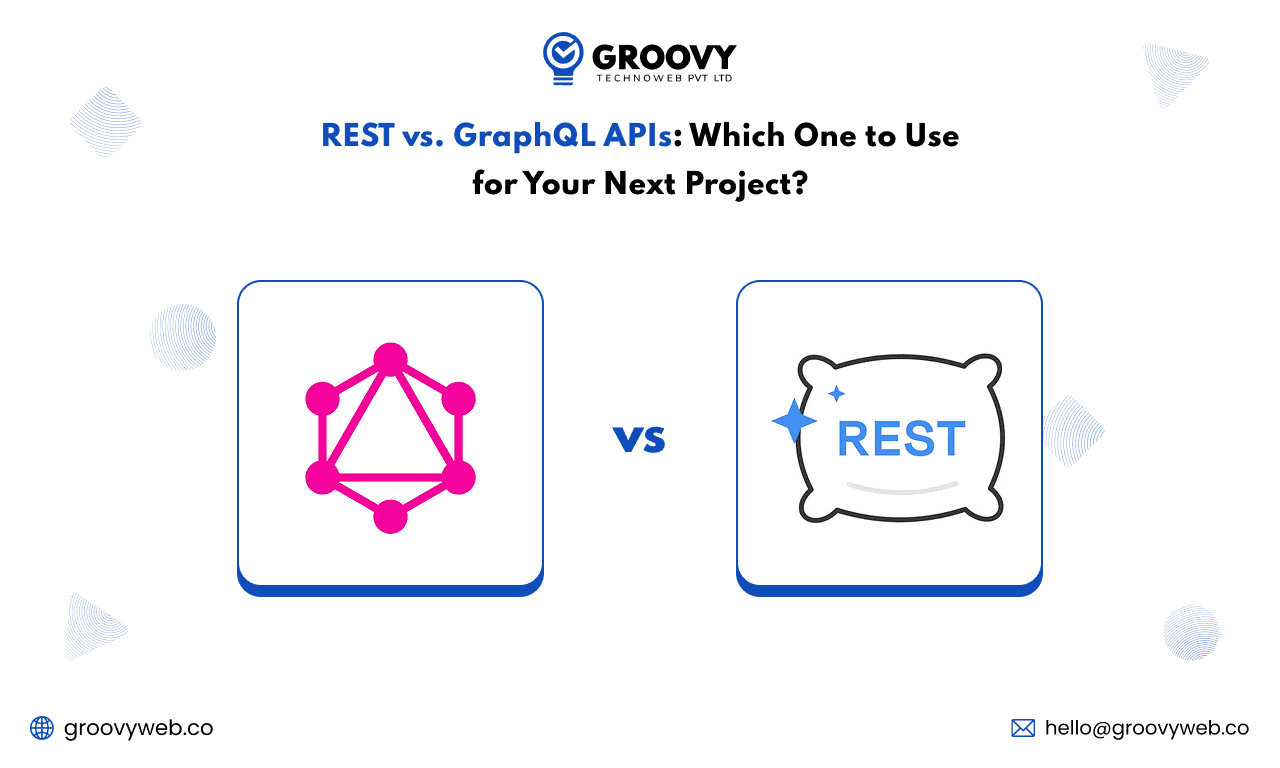
Ashok Sachdev
REST vs GraphQL APIs: Which One to Use for Your Next Project?
Technology 17 Apr 2025 9 min read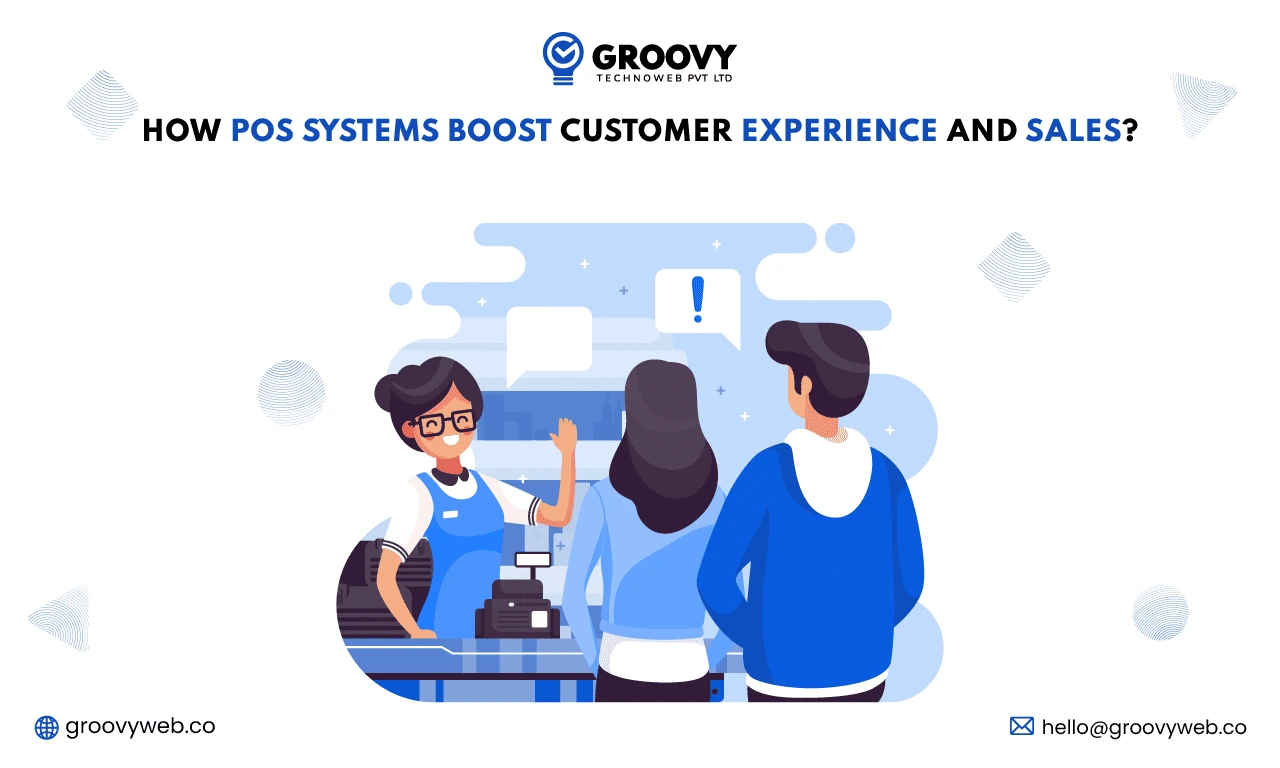
Ashok Sachdev
How Pos Systems Boost Customer Experience and Sales?
Web App Development 17 Dec 2024 12 min read
Nauman Pathan
How to Develop Cross-Platform App with Latest Tools and Frameworks
Mobile App Development 14 Nov 2024 20 min readSign up for the free Newsletter
For exclusive strategies not found on the blog